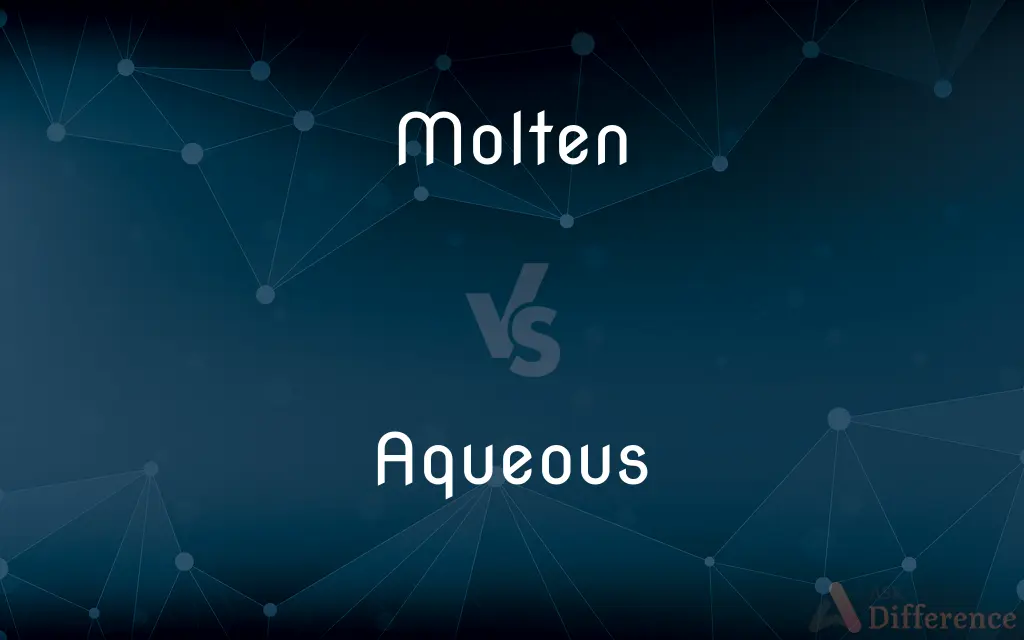Molten vs. Aqueous — What's the Difference?
Edited by Tayyaba Rehman — By Fiza Rafique — Updated on September 28, 2023
Molten describes substances in a liquid state due to heat, while Aqueous pertains to solutions where water is the solvent.

Difference Between Molten and Aqueous
Table of Contents
ADVERTISEMENT
Key Differences
Molten and Aqueous are terms that describe distinct states or characteristics of matter. The term "Molten" is used to characterize substances that have turned into a liquid form as a result of being subjected to high temperatures. Conversely, "Aqueous" is a term that describes solutions in which water acts as the solvent, dissolving other substances.
Molten materials, often metals or rocks, are typically encountered in conditions of extreme heat, such as in the earth's mantle or during metal casting. The molten state means that the material has surpassed its melting point and become liquid. In contrast, an Aqueous solution does not indicate the melting of a substance but rather its dissolution in water. For instance, salt or sugar dissolved in water results in an Aqueous solution.
Interestingly, while Molten substances are usually associated with high temperatures, Aqueous solutions can exist at a range of temperatures. You might encounter a Molten metal in a foundry, glowing red or white with heat. On the other hand, Aqueous solutions are omnipresent, from cold lemonade on a summer day to the hot coffee in your mug.
In essence, while both Molten and Aqueous indicate a liquid state, their causes differ. Molten is due to heat-induced melting, and Aqueous is due to dissolution in water.
Comparison Chart
Definition
Liquid state due to heat
Solution with water as the solvent
ADVERTISEMENT
Typical Examples
Lava, molten metal
Salt water, sugar solution
Temperature
Generally high
Can exist at various temperatures
Association
Melting of a substance
Dissolution of a substance
Requirement for State
Surpassing melting point
Presence of water
Compare with Definitions
Molten
In a fluid state because of extreme temperatures.
The blacksmith poured the Molten iron into a mold.
Aqueous
Pertaining to substances dissolved in water.
Salt forms an Aqueous solution when added to water.
Molten
Rendered liquid by heat.
The Molten lava flowed from the volcano.
Aqueous
Characteristic of solutions using water as the medium.
The Aqueous mixture was tested for pH.
Molten
Opposite of solid when referred to materials at high heat.
The ring was formed from Molten gold.
Aqueous
Relating to the properties or actions of water.
The Aqueous environment is ideal for these experiments.
Molten
Made liquid by heat; melted
Molten lead.
Aqueous
Relating to water or a solution in water.
The Aqueous solution turned blue after the reaction.
Molten
Made by melting and casting in a mold.
Aqueous
Of or involving water as a solvent.
The Aqueous phase was separated from the oil.
Molten
Brilliantly glowing, from or as if from intense heat
"A huge red bed of coals blazed and quivered with molten fury" (Richard Wright).
Aqueous
Relating to, similar to, containing, or dissolved in water; watery.
Molten
A past participle of melt.
Aqueous
(Geology) Formed from matter deposited by water, as certain sedimentary rocks.
Molten
Melted.
Molten metal
Molten wax
Molten rock
Aqueous
(chemistry) Consisting mostly of water.
Molten
Made from a melted substance. en
Aqueous
Partaking of the nature of water, or abounding with it; watery.
The aqueous vapor of the air.
Molten
Glowing red-hot.
Aqueous
Made from, or by means of, water.
An aqueous deposit.
Molten
(archaic) melt
Aqueous
Similar to or containing or dissolved in water;
Aqueous solutions
Molten
Melted; being in a state of fusion, esp. when the liquid state is produced by a high degree of heat; as, molten iron.
Molten
Made by melting and casting the substance or metal of which the thing is formed; as, a molten image.
Molten
Reduced to liquid form by heating;
A mass of molten rock
Molten
Melted substance, especially when discussing metals or rocks.
The furnace contained Molten metal ready for casting.
Molten
Pertaining to materials that have surpassed their melting point.
The Molten glass was skillfully shaped by the artisan.
Common Curiosities
What does Molten mean?
Molten refers to substances in a liquid state due to high temperatures.
And what does Aqueous signify?
Aqueous describes solutions where water acts as the solvent.
Can metals be Aqueous?
Metals themselves aren't Aqueous, but their salts can dissolve in water to form Aqueous solutions.
At what temperatures are substances typically Molten?
Substances are Molten at temperatures above their melting points, which vary depending on the material.
Can Aqueous solutions exist at room temperature?
Yes, Aqueous solutions can exist at various temperatures, including room temperature.
Can an Aqueous solution become Molten?
While both terms indicate a liquid state, they represent different causes; Aqueous for dissolution in water and Molten due to heat. However, a substance in an Aqueous solution could become Molten if isolated and heated.
Is lava considered Molten or Aqueous?
Lava is considered Molten.
Do Molten substances always solidify when cooled?
Yes, Molten substances revert to a solid state upon cooling below their melting points.
Why are some solutions termed Aqueous?
Solutions are termed Aqueous when water is the primary solvent in the mixture.
Are all Molten materials hot?
Generally, yes. Molten materials have been heated past their melting points.
Are all Aqueous solutions clear?
No, Aqueous solutions can vary in clarity depending on the solute and its concentration.
Can you provide an example of a Molten substance in daily life?
Yes, candle wax becomes Molten when the candle is lit.
Share Your Discovery

Previous Comparison
Wicked vs. Wretched
Next Comparison
Applicable vs. RelevantAuthor Spotlight
Written by
Fiza RafiqueFiza Rafique is a skilled content writer at AskDifference.com, where she meticulously refines and enhances written pieces. Drawing from her vast editorial expertise, Fiza ensures clarity, accuracy, and precision in every article. Passionate about language, she continually seeks to elevate the quality of content for readers worldwide.
Edited by
Tayyaba RehmanTayyaba Rehman is a distinguished writer, currently serving as a primary contributor to askdifference.com. As a researcher in semantics and etymology, Tayyaba's passion for the complexity of languages and their distinctions has found a perfect home on the platform. Tayyaba delves into the intricacies of language, distinguishing between commonly confused words and phrases, thereby providing clarity for readers worldwide.
















































